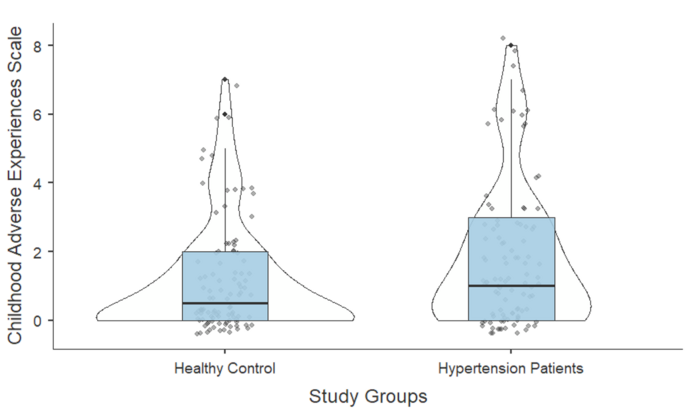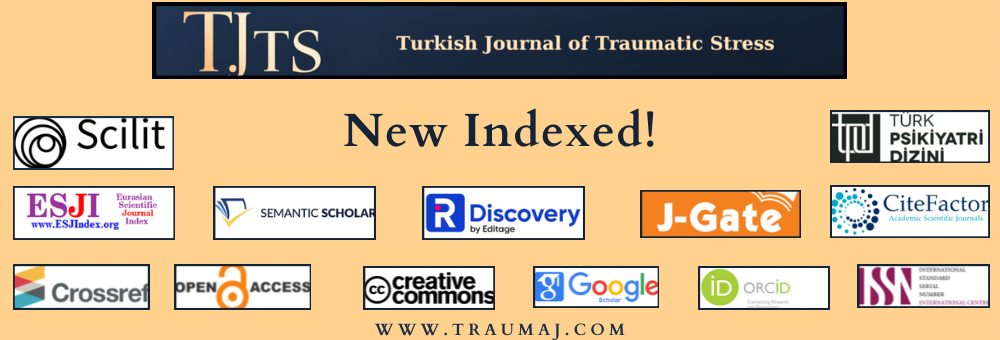Relationship of Adverse Childhood Experiences with Essential Hypertension: A Case-Control Study
Relationship of ACE with Essential Hypertension
DOI:
https://doi.org/10.63175/tjts.10Keywords:
Adverse Childhood Experiences, Childhood, Hypertension, Stress, TraumaAbstract
Background: The mental and physical impacts of adverse childhood experiences persist into adulthood, highlighting their long-term consequences. These physical effects are attributed to psychobiological processes, including anxiety, depression, stress, anger, sleep disorders , which influence inflammatory pathways. In the present study, it was aimed to compare the adverse childhood experiences of essential hypertension (HT) patients with healthy controls.
Methods: The sample of the current study consists of 200 participants, including 100 HT patients who applied to cardiology outpatient clinics and 100 healthy controls. HT was defined in accordance with the European Society Of Cardiology guideline. The sociodemographic data form and Adverse Childhood Experiences Questionnaire were applied to the participants who volunteered to participate in the study after obtaining their consent.
Results: The mean age of the participants included in the study was 51.55±8.90 years and 78.5% were women. There was no statistically significant difference in age, gender, marital status, income level, height and weight variables between the healthy control group and HT patients (p>0.05). Body Mass Index (t=-2.558, df=198, p=0.011) and ACE-Q (t=-2.609, df=198, 0.010) scores of HT group were found to be statistically significantly higher than healthy controls.
Conclusion: The present study shows that patients with HT are exposed to more adverse childhood experiences compared to healthy volunteers. This result supports studies showing that psychosocial factors may have an effect on the pathogenesis of HT.
References
1. Anda RF, Felitti VJ, Bremner JD, et al. The enduring effects of abuse and related adverse experiences in childhood. A convergence of evidence from neurobiology and epidemiology. Eur Arch Psychiatry Clin Neurosci. 2006;256(3):174-186. doi:10.1007/s00406-005-0624-4
2. Hughes K, Bellis MA, Hardcastle KA, et al. The effect of multiple adverse childhood experiences on health: a systematic review and meta-analysis. Lancet Public Health. 2017;2(8):e356-e366. doi:10.1016/S2468-2667(17)30118-4
3. Danese A, McEwen BS. Adverse childhood experiences, allostasis, allostatic load, and age-related disease. Physiol Behav. 2012;106(1):29-39. doi:10.1016/j.physbeh.2011.08.019
4. Shonkoff JP, Garner AS, Committee on Psychosocial Aspects of Child and Family Health, Committee on Early Childhood, Adoption, and Dependent Care, Section on Developmental and Behavioral Pediatrics. The lifelong effects of early childhood adversity and toxic stress. Pediatrics. 2012;129(1):e232-246. doi:10.1542/peds.2011-2663
5. Centers for Disease Control and Prevention (CDC). Vital signs: awareness and treatment of uncontrolled hypertension among adults--United States, 2003-2010. MMWR Morb Mortal Wkly Rep. 2012;61:703-709.
6. Basu A, McLaughlin KA, Misra S, Koenen KC. Childhood Maltreatment and Health Impact: The Examples of Cardiovascular Disease and Type 2 Diabetes Mellitus in Adults. Clin Psychol Publ Div Clin Psychol Am Psychol Assoc. 2017;24(2):125-139. doi:10.1111/cpsp.12191
7. Bosch NM, Riese H, Reijneveld SA, et al. Timing matters: long term effects of adversities from prenatal period up to adolescence on adolescents’ cortisol stress response. The TRAILS study. Psychoneuroendocrinology. 2012;37(9):1439-1447. doi:10.1016/j.psyneuen.2012.01.013
8. O’Connor DB, Green JA, Ferguson E, O’Carroll RE, O’Connor RC. Effects of childhood trauma on cortisol levels in suicide attempters and ideators. Psychoneuroendocrinology. 2018;88:9-16. doi:10.1016/j.psyneuen.2017.11.004
9. Kannel WB. Risk factors in hypertension. J Cardiovasc Pharmacol. 1989;13 Suppl 1:S4-10. doi:10.1097/00005344-198900131-00003
10. Obi IE, McPherson KC, Pollock JS. Childhood adversity and mechanistic links to hypertension risk in adulthood. Br J Pharmacol. 2019;176(12):1932-1950. doi:10.1111/bph.14576
11. Gündoğmuş PD, Gündoğmuş İ. Esansiyel Hipertansiyon Tanılı Hastaların Üstbilişler, Bilişsel Dikkat Kilitlenmesi ve Anksiyete Belirtilerinin İncelenmesi: Vaka-Kontrol Çalışması. Kahramanmaraş Sütçü İmam Üniversitesi Tıp Fakültesi Derg. 2023;18(1):28-34. doi:10.17517/ksutfd.1039089
12. Unger T, Borghi C, Charchar F, et al. 2020 International Society of Hypertension Global Hypertension Practice Guidelines. Hypertension. 2020;75(6):1334-1357. doi:10.1161/HYPERTENSIONAHA.120.15026
13. Centers for Disease Control and Prevention. national health and nutrition examination survey–health tech/blood pressure procedures manual. 2009.
14. Felitti VJ, Anda RF, Nordenberg D, et al. Relationship of childhood abuse and household dysfunction to many of the leading causes of death in adults. The Adverse Childhood Experiences (ACE) Study. Am J Prev Med. 1998;14(4):245-258. doi:10.1016/s0749-3797(98)00017-8
15. Gündüz A, Gündoğmuş İ. The relationship of adverse childhood events on automatic thoughts, intermediate beliefs, schemas, anxiety and depressive symptoms and quality of life in university students (tur). Turk J Clin PSYCHIATRY. 2019;22(4):424-435. doi:10.5505/kpd.2019.72621
16. Goodwin RD, Stein MB. Association between childhood trauma and physical disorders among adults in the United States. Psychol Med. 2004;34(3):509-520. doi:10.1017/s003329170300134x
17. Suglia SF, Clark CJ, Boynton-Jarrett R, Kressin NR, Koenen KC. Child maltreatment and hypertension in young adulthood. BMC Public Health. 2014;14:1149. doi:10.1186/1471-2458-14-1149
18. Stein DJ, Scott K, Haro Abad JM, et al. Early childhood adversity and later hypertension: data from the World Mental Health Survey. Ann Clin Psychiatry Off J Am Acad Clin Psychiatr. 2010;22(1):19-28.
19. Iniguez KC, Stankowski RV. Adverse Childhood Experiences and Health in Adulthood in a Rural Population-Based Sample. Clin Med Res. 2016;14(3-4):126-137. doi:10.3121/cmr.2016.1306
20. Su S, Wang X, Pollock JS, et al. Adverse childhood experiences and blood pressure trajectories from childhood to young adulthood: the Georgia stress and Heart study. Circulation. 2015;131(19):1674-1681. doi:10.1161/CIRCULATIONAHA.114.013104
21. Pretty C, O’Leary DD, Cairney J, Wade TJ. Adverse childhood experiences and the cardiovascular health of children: a cross-sectional study. BMC Pediatr. 2013;13(1):208. doi:10.1186/1471-2431-13-208
22. Danese A, Tan M. Childhood maltreatment and obesity: systematic review and meta-analysis. Mol Psychiatry. 2014;19(5):544-554. doi:10.1038/mp.2013.54
23. Glowa PT, Olson AL, Johnson DJ. Screening for Adverse Childhood Experiences in a Family Medicine Setting: A Feasibility Study. J Am Board Fam Med JABFM. 2016;29(3):303-307. doi:10.3122/jabfm.2016.03.150310
24. Colombo D, Suso-Ribera C, Fernández-Álvarez J, et al. Affect Recall Bias: Being Resilient by Distorting Reality. Cogn Ther Res. 2020;44(5):906-918. doi:10.1007/s10608-020-10122-3

Downloads
Published
How to Cite
Issue
Section
License
Copyright (c) 2025 Pınar Demir Gündoğmuş, Ersin Doğanözü, Mehmet Rıdvan Varlı, Kübra Özcan Çetin, Tayfun Öz

This work is licensed under a Creative Commons Attribution 4.0 International License.







